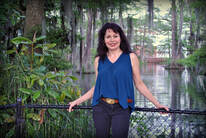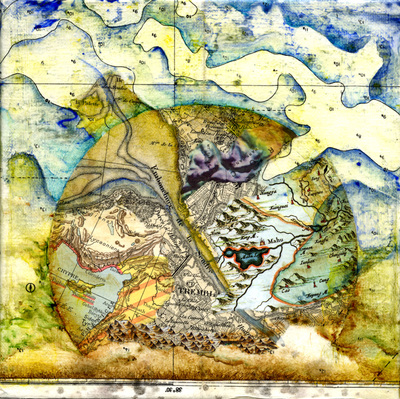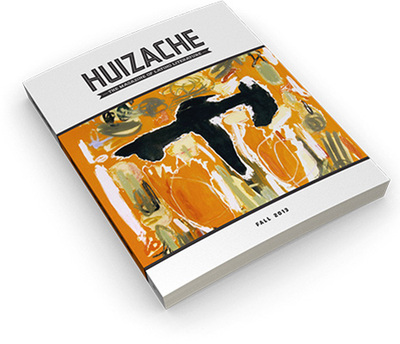CESCA JANECE WATERFIELD
Saltcherry Chorus: Voice I
Hung by whose hand,
plump
red gin-skin scored:
tiny door swings
blood morsels past,
wings water in.
Juice run thin
to tang,
by sun,
green-stemmed,
garnet-eyed, give in
to your father's axe.
Or plumb root
through soil,
dig in.
Here's a little cot
of salt
for your cut.
Saltcherry Chorus: Voice II
The red spiderlily sways, her mouth
a crown of pins.
Down into chicory flowers,
darkling beetles hang.
An aphid bothers
the gardenia stamen,
shaking its damp hammock.
I wonder for Wednesday's tryst,
the pond quivers, finding
its mind.
Fusarium,
thrip, leafminer.
His fist
is a rose
in my hair, fastening
occipital, parietal.
Raspberries picked between briars float
in a zinc basin
as if water had eyes,
and in bins where lamplight
can't crawl, moths gorge
on the newborn's coat.
Farrow, peephole, sycamore fig.
This is the way you scatter seed,
so don't come back
till you hit loam
or kiss the never-giver
in any soughing copse. Slattern,
slattern. Whistle
for luck through memory's birch-bark
slats and over the table peppered
with curls of a girl.
Saltcherry Chorus: Voice III
Radishes,
Rapunzel,
you must let down
your hair
from bell tower,
bell tower.
Tart cell polymorph,
pivot on your heart,
carnivorous,
a civet
in russet colored heat.
Corona radiata, ovum
on a pin
in ciliated tango,
salpinx and salpinx.
Tuba uterina,
pileus and bing,
watch bellflower
to bellflower,
the cardinal tail
his twin.
Cambium flamenco,
dance in duple thrall.
Codling moth, hang
from crab apple
espaliered to the wall. By privet hedge in fescue
a peacock crows and shakes
to entertain the odalisque
who swans her milky neck.
Vermilion finger,
juniper green thumb,
saltpeter for growing,
saltpeter for the gun.
You lift
a tray of cups turned over
emptying out their nectar,
spray of empty cups
emptying their splendor
and you think you're holding,
you think you're holding bellflowers,
bellflowers,
bellflowers.
Lot's Wife, Ado, Turns into a Pillar of Salt
They called to her, but Ado wasn't listening, she was thinking of a man,
his milk-smooth tongue, how he tasted like mineral some days, or fig,
in the house she often made dark against midday heat to prepare fruits
and pillow for the comfort of his sorrel skin. She remembered
quiet ways he spoke to her in the bed they dissolved hours. She saw
candle flash, his arms flex under hair the color of bronze, she felt
the rub of his rope-worn fingers. The others cried, Ado, come back.
Afraid, they believed clouds above them burned for purification.
But in wool-white blindness, she went down to it, to the room in Sodom,
and his hands were on her, they were coarse as bark, but soft too,
and as God in cloudfire turned and hardened his jaw to her, Ado saw
gold light swirl in a dish of honey on the table and she filled her arms
and breasts and mouth with it, her body spilled clear crystals
and filled with the throaty voice of the only thing she ever needed.
Une Scène dans Les Roses dans Les Roses
Plucked by her frost-pink cheeks from a bread line in Mordovia,
Celine Joie at age 5 was whisked to face the Ballet Master
of the Bolshoi, where she pliéd for splay-footed instructors
who disciplined her assiduously and thrust her
before hot lamps of the stage. After hushed viewing
of Scheherazade, the Shah cast her foot in bronze, lifting it
each night above the roast lamb before taking his meal.
The Marquis de Lafayette professed devotion to her
birdlike bones, before entering service to Washington
and the battlefield, ruined by his unrequited love. And so on.
Things took a turn at the Teatro alla Scala, where the audience,
driven from credulity by her dance, tore their cushions. They flung
bits onstage – crushed velvet adorned with roses. They shouted,
Brava! and Encore! and The dictator slew my family!
Outraged by the chaos she’d stirred with pointed toes,
government bigwigs banished the dancer. Holed up in a Paris attic,
she felt flaccid as a folk hero spray-painted in one dimension.
For amusement, she talked to herself:
Recalling arms raised like parentheses, she formed a vowel,
and then others. Consonants beat staccato against the roof of her mouth
like battement, and punctuation recalled plush, measured landings
from mid-air. Her voice soon reached the highly-secret
Ballerina Mafia, who picked up her signal
with antennae bearing pink satin ribbons. One day, a guerilla
pas de quatre arrived to fetch her. Like small, ferocious swans,
they climbed above the rooftops, flapping through the night.
They landed at last on a remote island where she may
or may not remain. Phoning for comment, attentive listeners hear
only soft tinkling of small bells, woodwinds as in overture,
the rustle of wings, and Edith Piaf singing through the static,
c’est la vie, la vie en rose.
Copyright © November 2019 Cesca Janece Waterfield

Cesca Janece Waterfield grew up in the woods and shore along the Rappahannock River of Virginia. She teaches composition at the University of Wisconsin-Milwaukee where she is studying for a PhD. Her work has appeared or is forthcoming from Scalawag Magazine, Writers Resist, Deep South Magazine, The Other Stories, and others. She received the 2017 Editor’s Prize in Fiction from MARY: A Journal of New Writing, judged by Natalie Baszile.









